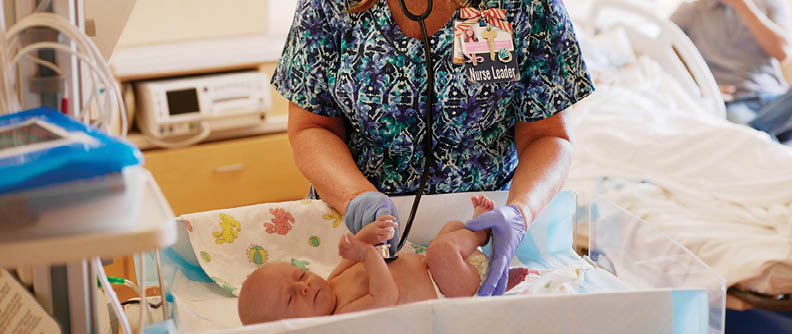In the days following your baby’s birth, your care team will perform several newborn tests and treatments to help give them a healthy start in life. These are essential for keeping your newborn well and detecting any serious problems early. Here are some common tests you can expect.
Bilirubin screening
As it replaces old red blood cells, your baby’s body makes a yellow substance called bilirubin. This is usually broken down by the liver and then removed from the body during bowel movements.
When a newborn has a high level of bilirubin, the skin and the whites of the eyes appear yellow. This is a condition known as jaundice. We screen all infants for jaundice with a simple blood test while the baby is in the hospital.
In most cases, jaundice is mild and usually goes away without needing treatment. However, if jaundice is left untreated it can cause serious problems. Babies with high levels of bilirubin who aren’t treated are more likely to become deaf. In some cases, untreated jaundice can even lead to brain damage.
A quick bilirubin screening and, if needed, phototherapy, which is a treatment with a special light, can protect against the serious complications of jaundice.
Hearing test
Newborns are typically screened for hearing before leaving the hospital. It’s important to perform this test early so your baby can receive the treatment they need to reach developmental milestones.
Hearing screenings only take a few minutes. They’re usually performed while your baby sleeps. During the screening, a member of your care team places special sensors on your baby’s head, the back of the neck, and the shoulder. Then, baby-sized earphones are placed over their ears.
When everything is in place, we play soft sounds through the earphones. A computer records your baby’s response to the sounds.
Don’t worry if your baby doesn’t pass the first hearing test. It can be repeated before you leave the hospital. If your baby doesn’t pass the test a second time, we’ll help you make an appointment to follow up with an audiology clinician.
Newborn blood screening
Using a small sample of your baby’s blood, doctors will check for metabolic, endocrine, and hemoglobin diseases. If your baby has one of these conditions, a special diet or certain medications may help prevent ongoing health issues.
Pulse oximetry
Using small sensors, this test measures the amount of oxygen in your baby’s blood. It is a simple, painless test used to identify the most common type of birth defect, congenital heart disease.
You’ll likely receive the results from any newborn screening test within 48 hours. Your care team will let you know what any test results mean, and whether your baby needs any special care.
Your care team also provide several treatments within the first few days of your baby’s birth. Here’s what you can expect.
Erythromycin eye ointment
Before and during labor, your baby could potentially be exposed to sexually transmitted infections which may affect the eyes. Erythromycin is an antibiotic that prevents your newborn from harm due to these infections. Your care team applies the ointment immediately after birth. This treatment has proven safe for all newborns.
Hepatitis B vaccine
Hepatitis B is a serious disease that affects the liver. To prevent infection, your care team provide a vaccine as part of routine care for newborns. Most babies have no side effects.
Vitamin K injection
The body needs vitamin K for blood to clot properly. All babies are born with low levels of this vitamin, so your care team will give your newborn a single injection of it to prevent problems such as bleeding. Your baby’s body will begin making its own vitamin K within a few weeks.
Talk to your care team if you have any concerns about any of the newborn tests and treatments that are recommend in the early days and weeks of your child’s life. It can feel overwhelming and your care team is here to answer any questions.
